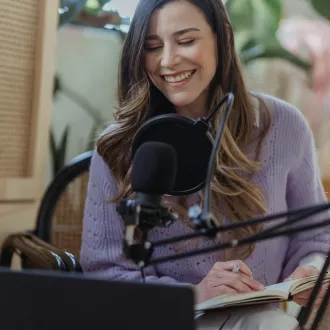Transcription Learning to listen actively
Active listening is a fundamental skill in couple communication. Often when we think about communication, we focus on the part of expressing our thoughts and feelings, but we forget the importance of really listening to our partner. Active listening involves paying full attention, showing genuine interest and fully understanding what the other person is communicating. Through active listening, we can build a solid foundation for effective communication and strengthen our relationship.
The goal of active listening is to understand and validate our partner's thoughts, feelings and concerns. By practicing active listening, we can provide our partner with a safe space to feel heard and understood, which fosters trust and openness in the relationship. Below, we will explore in detail the different aspects of active listening and how we can learn to apply it in our couple's communication.
Attitude and disposition: Active listening starts with the right attitude and disposition. It is important to show genuine interest in what our partner has to say and be willing to devote time and attention to the conversation. We should avoid being distracted by electronic devices or irrelevant thoughts and focus on being present in the moment of communication.
Mindfulness: Mindfulness is key to active listening. It means being fully present in the conversation and paying attention to our partner's words, nonverbal language and emotions. Let's avoid interrupting or jumping ahead in our thoughts while the other person is speaking. Instead, let's practice patience and concentration to fully understand the message being conveyed.
Show interest and empathy: It is important to show genuine interest in what our partner is saying. We can do this by making eye contact, nodding our head, and providing verbal or nonverbal responses that indicate we are actively listening. In addition, we should practice empathy, trying to understand and share our partner's emotions and perspectives. Empathy helps us connect emotionally and strengthens communication in the relationship.
Avoid judgment and criticism: Active listening involves suspending judgment and criticism while listening to our partner. Instead of forming hasty opinions, let's provide space for our partner to express him/herself freely. Remember that we all have different experiences and perspectives, and it is important to respect and validate our partner's thoughts and feelings, even if we disagree with them.
Ask clarifying questions: To better understand what our partner is communicating, we can ask clarifying questions. These questions help us gain more information and clarify any misunderstandings. However, we must be sure to ask questions in a respectful manner and without interrupting the flow of the conversation. Clarifying questions demonstrate our interest and commitment to understanding.
Importance of active listening: Practicing active listening allows us to develop skills in asking open-ended questions that encourage a more detailed response from our partner. These open-ended questions invite reflection and dialogue, rather than simple, closed answers. For example, instead of asking "Are you angry?", w
listen actively




